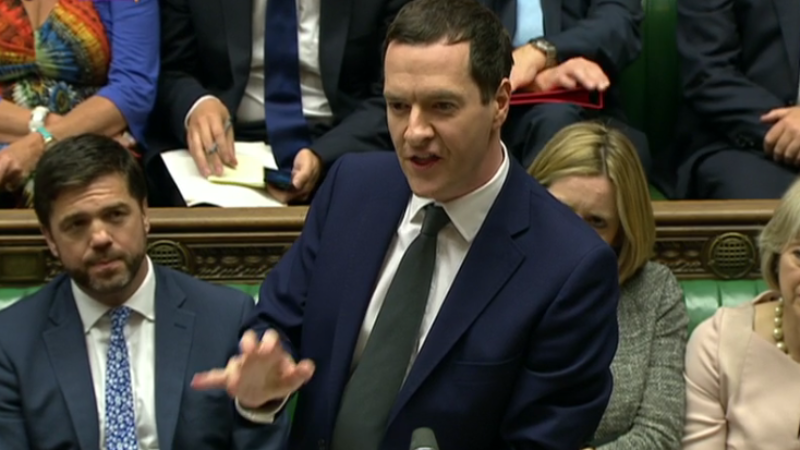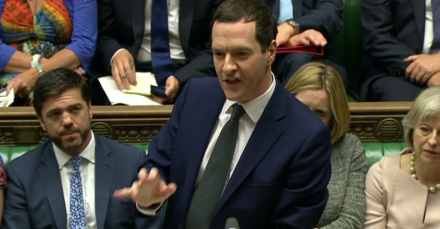

George Osborne is the current favourite for the Tory succession. He (along with retiring David Cameron and political strategist Lynton Crosby) is largely credited with the electoral success of the Tories. He’s come a long way from the Omnishambles budget and his subsequent Paralympic booing. He recently came top for the third month in a row on the ConHome future leadership poll.
Cameron announced that he wanted to serve a full term and then step down, but recent history shows that to be unlikely. Prime Ministers rarely get to choose the timing of their departure losing out either electorally or internally. And despite their glee at what they perceive as the frailties of the current Labour Party, there are going to be plenty of opportunities for the Tories to turn in on themselves. In fact, their complacency about the Corbyn-led Labour Party may well make this more – not less – likely. Osborne may yet become leader within a couple of years. Labour must do all it can to damage him irrevocably in the eyes of the public between now and then.
Osborne is a strange character and the contrast with Cameron is very interesting. Like Jane Austen’s Wickham and Darcy, I am told by those who have met them both that their public images (Cameron as affable and Osborne a cold fish) are entirely the reverse in reality. But Osborne’s lack of perceived likeability will not be the stick to beat him with. It’s basically factored in to his brand and his message of “don’t like me, but trust me with your economy” works well for him and the Tories as a whole.
In many ways, Osborne is Gordon Brown to Cameron’s Heir to Blair act. Not economically of course, but his obsession with finding dividing lines, wedge issues and traps for the opposition to fall into is very similar to Brown. And much like Gordon Brown, he may prove to be more popular with his Party than with his country. Polling currently shows him trailing both Boris Johnson and Theresa May in their eyes as best future leader.
It may be Osborne’s obsession with the Labour Party that is his downfall. His Fiscal Charter – designed almost entirely to put Labour on the wrong side of the political argument with the public – is economically illiterate. Osborne is binding his own hands in all but the most extreme of circumstances. Legislating against the ability to borrow to invest has the capacity to strongly threaten our ability to grow. And it will be growth that Osborne as Chancellor will need to convince that his are the safe pair of hands the country wants leading them.
the hiking of the minimum wage is to be welcomed. It will make a big difference to some of our poorest paid workers. But in calling it a “living wage” Osborne has overreached and may well suffer damage from this hubris. it is not a living wage as recognised by the independent Living Wage Foundation. Stories will abound of those unable to live on it. As the Tories continue to do nothing to solve problems in the housing market (especially the private rented sector) those costs will quickly outstrip the pay hike for many.
Then there is possibly his biggest error or all, the cuts to tax credits.
Again this move comes from a place of trying to put Labour on the wrong side of a simplistic welfare argument. But recipients of Tax Credits are hard to turn into the cartoon figure of the work shy dole scrounger that Osborne is so determined to tie to Labour. The vast majority are working people whom Capitalism is failing as they simply cannot earn enough from their jobs to live on. Six million households are due to lose an average of £700 a year. That’s a lot of hardship for people who are the strivers of Osborne’s simplistic divisions.
This can play out in one of two ways. Either Osborne sees the error of his ways and makes an adjustment in his autumn statement that will mitigate and ameliorate the worst of what is to come. To do so he will lose a lot of political capital in a U-turn that many feel he should never have got to. Once again – like the Omnishambles, Osborne will be hoist by his own petard and have damaged his own credibility. Just in time for the Tories to start tearing themselves apart over Europe next year.
Alternatively, he carries on regardless. This is the option the Tories fear the most. It was one of the most discussed fears in the Conference bars and corners. Too many people will suffer. Tory MPs will see troops of the working poor increasingly unable to cope in their surgeries week in, week out while those suffering will the the Tories tearing themselves apart over Europe. A policy area that is emotive for some, but distant from the bread and butter issues that concern most of us.
I have described Osborne’s dressing up of Tory policy in Labour language as “Jujitsu” politics. He uses our greatest strengths against us. It is time we learn to play the same game. Osborne’s strengths in the Tory Party may well be his greatest weaknesses with the country. But we need to be canny. Simply calling him an “evil Tory” won’t work. The public aren’t looking for nice, they’re looking for competent. But by bringing in the Fiscal Charter Osborne is showing political strength and fiscal incompetence. And the tax credit cuts are a politically nihilistic juggernaut aimed at the heart of the government’s “on your side” messaging.
We must now work not just to oppose these measures; not just to offer an alternative, but to make sure that everyone understands that Osborne has chosen this path of least competence. We must tie his credibility to its failure.




More from LabourList
Letters to the Editor – week ending 15th February 2026
‘Labour council candidates – it’s tough, but all is not lost’
‘Labour won’t stop the far right by changing leaders — only by proving what the left can deliver’